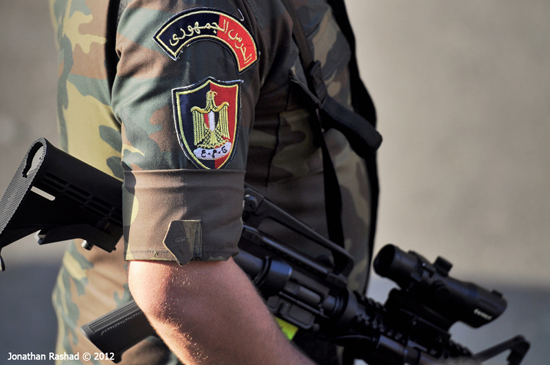Shortly after dawn on Monday, the single most deadly clash to occur following Morsi’s ouster so far began when soldiers and police officers opened fire on a pro-Morsi crowd that had gathered outside of the Republican Guard facility where Morsi was thought to be held. While it is known that the pro-Morsi crowd that bore the brunt of the violence was performing the morning prayer when the violence began, the exact conditions under which what has been described as a massacre began were not entirely clear, and calls for independent investigations came from all sides.
For its part, the military has declared that the forces guarding the Republican Guard building were attacked first by an “armed terrorist group.” They have alleged that soldiers were shot with live ammunition both from on the ground and from surrounding rooftops. The military thus considers its actions to have been defensive, and in support of their claim, they claimed to have seized “large quantities of firearms, ammunition and Molotov cocktails” from the more than 200 protestors apprehended during and after the event. The Guardian briefly relays the story of one protestor who appears to say that a soldier was the first person shot: “We were praying and I heard an army officer saying ‘don’t shoot, don’t shoot.’ He was the first to be shot. They started shooting tear gas and live ammunition.” However, another demonstrator interviewed for the same article indicates that “[the] army came from Saleh Salem Street [the road leading to the site; i.e. from behind] and started shooting at us.”
The Muslim Brotherhood indicates that the military initiated the conflict, firing into the crowd without prior provocation. They suggest that the army “fired teargas and gunshots at [the protestors] without any consideration for the sanctity of prayers or life.” It is widely claimed that most of the protestors shot were shot in the back. Testimony gathered by Amnesty International indicates that the security forces, approaching from several directions at once, initially tried to break up the protest camp in front of the Republican Guard compound. When they met resistance, the situation escalated to a live fire event. It is not clear how the timing of this attempted clearing action may relate to the purported “armed terrorist” attack on the Republican Guard facility itself.
Amid the calls for independent investigations, condemnation of the military response came quickly from both within Egypt and from foreign governments. In addition, Amnesty International, among others, has stated that even if the military’s portrayal of the event is accurate, their response was a “disproportionate” show of “excessive force.” In response to the violence, the Salafist al-Nour Party, which had previously intended to participate in the interim government, backed out of its pledged cooperation. Condemnation also emerged from within the Brotherhood against its own leadership. The event was described as the “breaking point” for , who began coordinating a new movement titled “Brotherhood without Violence.”
In total, at least 51 civilians were killed with over 400 injured. One soldier and two policemen were also killed. A judicial committee was formed by the interim administration to investigate the incident.
Later on Monday, Interim President Adly Mansour announced that a panel would be appointed within 15 days that would create amendments for the existing constitution. The changes to the constitution would be voted upon by the Egyptian people within four months. The full plan included parliamentary elections to follow in early 2014, with the election of a new president coming after the parliament had assembled.
During the day, media representatives perceived as sympathetic to the Muslim Brotherhood were harassed. Specifically, al-Jazeera journalists were ejected from a military press conference, and 22 of their employees in Cairo resigned after a raid by Egyptian security forces. The resignations, however, were described by anchor Karem Mahmoud as being a protest against the channel’s “biased coverage,” not against the security forces’ action. The Guardian also notes that state media has not been critical of the military since July 3.
Finally, a seaport and a traffic police department were attacked in Port Said.
